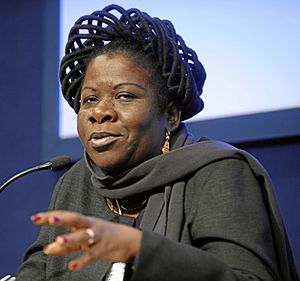Luísa Diogo facts for kids
Quick facts for kids
Luísa Diogo
|
|
|---|---|

Diogo in 2009
|
|
| 11th Prime Minister of Mozambique | |
| In office 17 February 2004 – 16 January 2010 |
|
| President | Joaquim Chissano Armando Guebuza |
| Preceded by | Pascoal Mocumbi |
| Succeeded by | Aires Ali |
| Minister of Economy and Finance | |
| In office 2000–2005 |
|
| Preceded by | Tomaz Salomão |
| Succeeded by | Manuel Chang |
| Personal details | |
| Born | 11 April 1958 Magoé, Portuguese Mozambique |
| Political party | FRELIMO |
| Alma mater | Eduardo Mondlane University University of London |
Luísa Dias Diogo, born on April 11, 1958, is an important politician from Mozambique, a country in southeastern Africa. She made history by becoming the first female Prime Minister of Mozambique. She served in this top leadership role from February 2004 to January 2010.
Before becoming Prime Minister, she was the Minister of Planning and Finance. She continued to hold that important financial role for a short time after becoming Prime Minister. Luísa Diogo is a member of the FRELIMO political party, which has led Mozambique since it gained independence in 1975.
Contents
Early Life and Education
Luísa Diogo studied economics at Eduardo Mondlane University in Maputo, the capital city of Mozambique. She earned her first degree in 1983.
Later, she continued her studies at the School of Oriental and African Studies at the University of London in 1992. There, she earned a master's degree in financial economics, which is about how money and economies work.
Career in Government
Luísa Diogo started working in the Mozambique Finance Ministry in 1980, even while she was still a university student. She quickly moved up in her career.
By 1986, she became a department head. In 1989, she was named the national budget director, which meant she was in charge of planning the country's money. After that, she worked for the World Bank in Mozambique, helping with various programs.
In 1994, she joined the FRELIMO government as the Deputy Minister of Finance. She worked under President Joaquim Chissano.
Becoming Prime Minister (2004–2010)
In February 2004, Luísa Diogo was chosen to be the Prime Minister of Mozambique. She took over from Pascoal Mocumbi. She also continued to serve as the finance minister until 2005.
As Prime Minister, Diogo focused on several important issues for her country and for Africa.
Helping People During Floods
In 2007, Mozambique experienced severe floods in the Zambezi valley. Some farmers were hesitant to leave their homes and animals in the dangerous low-lying areas. To keep people safe, Prime Minister Diogo ordered that citizens in these areas be moved to higher ground.
Improving Health and Equality
Luísa Diogo strongly believed in improving health services for everyone, especially for women and children. She encouraged health ministers across Africa to provide free health services. She believed these services could greatly reduce the number of babies and mothers who died during childbirth. They could also help stop the spread of AIDS and promote gender equality, meaning fairness between boys and girls, men and women.
She also worked to empower women. She helped launch a "Network of Women Ministers and Parliamentarians" (MUNIPA). This network aimed to encourage new laws and policies that would help women have more opportunities and be treated equally in all parts of society and government.
Life After Being Prime Minister
After her time as Prime Minister ended in 2010, Luísa Diogo continued to work on important global issues.
In August 2010, the United Nations Secretary-General, Ban Ki-moon, asked her to join a special group called the High-Level Panel on Global Sustainability. This group worked on ideas to make the world more sustainable for the future.
In 2014, Luísa Diogo ran for president within her FRELIMO party. She came in second place to Filipe Nyusi in the party's elections for the candidate in the general elections that year.
She has also served on the boards of various organizations and companies, including being the Chairwoman of the Board for Absa Bank Mozambique since 2012. She is also a member of the Club de Madrid, which is a group of former democratic presidents and prime ministers who work to promote democracy and good governance around the world.
See also
 In Spanish: Luisa Diogo para niños
In Spanish: Luisa Diogo para niños
- Heads of Government of Mozambique

